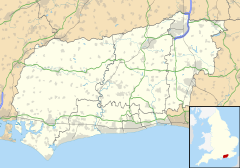Slinfold
| Slinfold | |
|---|---|
 St. Peter's parish church |
|
| Slinfold shown within West Sussex | |
| Area | 16.95 km2 (6.54 sq mi) |
| Population | 1,647 (2001 census) 2,055 (2011 Census) |
| • Density | 97/km2 (250/sq mi) |
| OS grid reference | TQ1131 |
| • London | 45 miles (72 km) NNE |
| Civil parish |
|
| District | |
| Shire county | |
| Region | |
| Country | England |
| Sovereign state | United Kingdom |
| Post town | Horsham |
| Postcode district | RH13 |
| Dialling code | 01403 |
| Police | Sussex |
| Fire | West Sussex |
| Ambulance | South East Coast |
| EU Parliament | South East England |
| UK Parliament | |
| Website | Slinfold Parish Council |
Slinfold is a village and civil parish in the Horsham District of West Sussex, England.
The village is almost 4 miles (6.4 km) west of Horsham, just off the A29 road.
The parish covers 4,186 acres (1,694 ha). The 2001 Census recorded a population of 1,647 people living in 627 households of whom 780 were economically active.
Slinfold is the source of the western River Adur, which flows to the English Channel at Shoreham-by-Sea
There has been a house at Dedisham, 1 mile (1.6 km) northeast of the village, since at least 1271, when Henry III granted the then occupier a licence to crenellate the manor house then on the site. The present house on the site appears to date from the 16th or 17th century. During the English Civil War the Parliamentarian commander Sir William Waller sacked a house on this site in 1643.
Slinfold Manor, 1.5 miles (2.4 km) south of the village, is a Georgian house built late in the 18th century.
The Church of England parish church of Saint Peter was designed by the Gothic Revival architect Benjamin Ferrey in a late 13th-century style and built in 1861 on the site of the original medieval parish church.
Slinfold Chapel is linked with Horsham United Reformed Church.
Slinfold railway station on the Cranleigh Line was opened in 1865 and closed in 1965. The trackbed of the line now forms part of the Downs Link Bridleway. The route of the former Roman road linking London and Chichester passes through the parish and a Roman posting station existed at Alfoldean. In 1848 it was recorded that Roman swords and brass ornaments had been found in the parish.
...
Wikipedia

